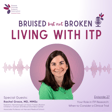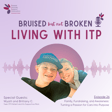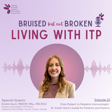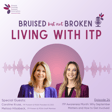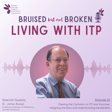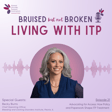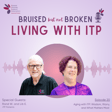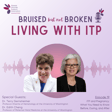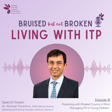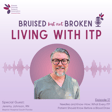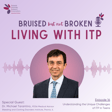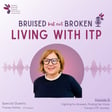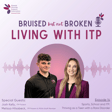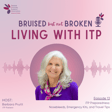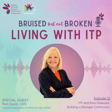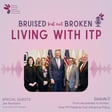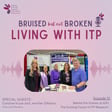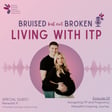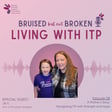Impact of ITP on Families
00:00:00
Speaker
I could probably write a book with all of the quotes I've gotten back from parents and all of the things that they've said to me saying, you don't know how much has this changed our entire family? Because it's not just a child that's going through this, the whole family is really going through it. And so this is a way to to help those kids.
Introducing 'Bruised But Not Broken' Podcast
00:00:21
Speaker
Welcome to the PDSA podcast, bruised but not broken, living with ITP. The diagnosis of a bleeding disorder like immune thrombocytopenia may leave you wondering, how can I really live my life with ITP? PDSA's podcast, Bruised But Not Broken, Living With ITP, brings empowering stories, the latest research and treatment updates, lifestyle tips, and answers to the real life questions the
00:01:01
Speaker
Hello, thanks for joining us today at Brews But Not Broken.
Support and Information from PDSA
00:01:05
Speaker
You might not be aware of all the things that the PDSA has to offer us ITP patients. It is immense. ah Really, there's a plethora of information that they provide to us, but there's also so many different ways in which they support us. I was thinking about parents and how Anxious they must be when it comes to having a child being diagnosed with ITP. So I thought, well, you know
Resources for ITP Families by Jodi Shai
00:01:35
Speaker
what? Let's speak to Jodi Shai. She is the director of programs and events for the Platelet Disorder Support Association. And I'd like her to go over some of the opportunities that parents have. Welcome Jodi. Thank you. And I'm happy to be here.
00:01:54
Speaker
and share these resources that we have available for parents of children. When parents contact us, a lot of times they are frightened. They just want to find all of the resources that they can for their children. And so not only do we talk to them about membership and the importance of membership within the organization, but we talk about some things that we have available to them as resources for their children. Right. And I wonder when a parent calls you initially It must be so frightening for them. It is. And they're looking for answers. They want to immerse themselves in everything that they can and all of the information about this, what's going to happen to their child and whatnot. Right. It's it's it's got to be a very scary situation. I know being diagnosed as a child, I didn't have those same fears, but being a parent, I can
00:02:50
Speaker
understand the anxiety that a parent would feel with any kind of a diagnosis, but something especially like this that you don't know anything about. So what is the first thing that you would tell a parent about that would help alleviate some of that anxiety?
Poker Club Program for Children's Anxiety
00:03:06
Speaker
So the first thing that I usually talk to them about beyond membership is our poker club program. ah This program was developed in 2014, and it was developed to help ease the fear, anxiety, and pain that's associated with frequent needlepokes. And usually by the time parents are getting to us, their child has had multiple needlepokes trying to figure out what it is that their child is going to be diagnosed with. And so the poker club program was designed to give children a prize, if you will, for getting needle pokes. There should be some reward for it. I know as an adult, we don't like needle pokes. So for children, it can be really traumatic and almost create a needle phobia for them. Right, which is something that they don't want to have because it's going to happen again and again in the future.
00:03:59
Speaker
Absolutely. So parents, when they contact me, I let them know about the poker club. We do limit it to PDSA members in the US and Canada. But the program is, we will send out a kit to your child. And in it is a buzzy distraction device, which was created by Dr. Amy Baxter.
00:04:20
Speaker
And it uses vibrations and cold ice packs to distract the brain so that you don't notice the needle pokes. So that is part of the kit along with we have distraction cards that the kids can look at as they're going through their either their CBC or their treatment. We also have a scorecard in there and we have poker chips.
00:04:42
Speaker
And so the point of the program is every time a child gets a needle poke, their parent puts a ah point on the scorecard and they give them a poker chip. By the time they get to 10 needle pokes, they filled a scorecard. They have all their poker chips. Their parents contact me and I send the child out a prize.
00:05:01
Speaker
They get another scorecard and 10 more poker chips. So they get prizes for every scorecard that they fill. And we look at that as a way to reward them for all of these needlepokes. But those poker chips also can show them it's a visual representation of how many needlepokes they've had, which I've had some kids who I think they're at 80 or 90 needle pokes since they started this journey, which is a lot. If you think about every time they're getting a blood draw or a treatment, they're getting a needle poke. And so this program is just a small way to help ease that fear and that burden for them and for their parents. I could probably write a book with all of the quotes I've gotten back from parents and all of the things that they've said to me saying, You don't know how much has this changed our entire family because it's not just a child that's going through this, the whole family is really going through it. And so this is a way to help those kids. This program is really, it's my favorite of all we have.
00:06:01
Speaker
Well, you have to think about a child knowing that they're going to the doctor in the morning. Are they going to sleep well the night before if they're afraid of the needle poke and they know that that's in their future? The little buzzy bee thing that comes with the kit, it it actually looks like a stuffed bee, doesn't it kind of? It does. It's shaped like a bee and then the wings of it are the ice packs. So the parent puts that on just above where the child is going to get their needle poke. They put it on before the needle poke and it distracts the brain. So the children don't realize that they're actually getting the needle poke. So many parents have told me it has been a game changer for them
00:06:42
Speaker
I've had parents who tell me that their child and immediately becomes fearful in the car going to where they're getting their blood drawn. And so it's so traumatic and it makes me so sad as a mom. I can't imagine having to do that to my child. So this device really helps distract the brain. And again, they get prizes for it. So when I started with PDSA in 2015, there were 24 children involved in the program.
00:07:10
Speaker
last week I sent out my 183rd kit. That's fabulous. It's amazing. I love these kids. I know their story and their parents have shared so much with me. They share photos of their child actually getting needle poked smiling as they have Buzzy with them. And that really makes all the difference for children who have to go through this and experience this. Well, I would think that also the poker chips are kind of like a and acknowledgement of your, of their bravery. Absolutely. Absolutely. We have stickers, we have temporary tattoos that we send to them in the kit so that they are, they have something tangible to hold on to. When this program was created, it was based on Beads of Courage, which is used for cancer patients.
00:07:58
Speaker
And, but ITP patients can't participate in that because they don't have cancer. So this is a way to actually have some tangible thing that they can say, this is how many needlepokes I've had. Here's the prizes that I've gotten for it. And, um, it's just really a remarkable program.
00:08:15
Speaker
What kind of prizes do you send the kids? We have everything from awareness bracelets, awareness, like stress balls. We have t-shirts. My favorite is when parents send me a picture of their child wearing. um We have a PD platelet t-shirt and their child is wearing that as they're going to get their needle poke and they've got their buzzy. You know, it runs the gamut and we do have kids. This program is open to children up to age 18.
00:08:41
Speaker
So I still have kids in the program who are 16 and 17, but they're still getting those poker chips. One young man wants to play poker with his friends with those so that they can kind of understand and see a visual of how many needlepokes he has had on this journey. It's really, it's such an amazing program. um Parents are so thankful and the kids are so thankful for it. It really does help the burden of those needlepokes.
00:09:08
Speaker
That's great. Now, how would a parent go about getting that
Enrolling in the Poker Club Program
00:09:12
Speaker
kit from you? Do they call you at the PDSA office and ask for it? Yeah, so they can contact the office, they can either call us, they can um send me an email and ask about it. When parents, if they sign up for membership with PDSA and we get the notification that it's a parent of a child, I will reach out to them and ask them if their child is interested in being part of the program. I think 10 times out of 10, the parents do want their child to be part of the program. Like I said, we do limit it to paid PDSA members, but
00:09:48
Speaker
For parents, that $25 is nothing compared to um you know what they're experiencing with the program. Well, my understanding is just that buzzy bee thing by itself is like a $75.
00:10:02
Speaker
you know the at yeah tired now exactly The entire kit itself is about $75 to send out, which but you know we're not charging for that. It's just the parent's $25 membership plus they get all the membership benefits. When I am letting them know about the program, I do let them know that not only is their child receiving this, but they'll also be getting information then about ITP and PDSA and they're a member for a year. so really for most parents, it's just something that they, you know, absolutely they want their child to receive this.
00:10:37
Speaker
Well, that's great. And I know that there's other things that the PDSA offers for
Educational Resources on ITP
00:10:44
Speaker
parents. And one of them is the booklets. The booklets are predominantly written for adults, but there is a special booklet just for children, which really explains it in more simple terms for a child to hopefully understand.
00:11:01
Speaker
That book is Understanding ITP. It's an illustrated book, and it is written for children, for children to understand this diagnosis, what it means, kind of what they're going through. That booklet, I have had so many people tell me,
00:11:19
Speaker
I understand, I understand this process. You can go online, you can look at all of the resources that we have, but this really explains it in a way that people can understand it. Those booklets I have sent out to a patient to his entire class, they all wanted to understand what it was that he was going through. I have a mom who contacts me every year and says, during Awareness Month in September, I want to give these out to my son's class so they understand what he's going through.
00:11:47
Speaker
I had a young man whose mom reached out to me and he is afraid to wear shorts because he has bruising. And so his mom gave his teacher that booklet and she did an entire science lesson on ITP.
00:12:01
Speaker
And that child was able to share with his classmates what it is that he goes through. And they could understand it using that booklet, which was amazing. This child felt empowered because he could tell everybody exactly what it is that he's going through. So those booklets are really, really helpful um from both a the child and the parent perspective. And we also have resources for them to take to school as well.
00:12:26
Speaker
Well, I think the booklets are also important for extended family members because I know when you have a diagnosis like this and you're trying to understand it yourself, we're just a part of a bigger family or friends. And if you can share that information with them in a way that they can understand it, it certainly makes it easier as a parent of a child to know that you've explained it and you have support um from your friends or family.
00:12:56
Speaker
Absolutely. I think that that's critical when dealing with this, that your entire community that's around you really understands what it is that you're going through. And I always say it's not just the patient going through this. that There's a whole community of people who are around them, who are supporting them. right And one other thing that we we have available, which is important, children are in school and they don't want to have to sit out from things, but it's important that the school understands what this child is going through. And so we have a school resource packet that we can provide to the parents and they can share that with the school that has ah has booklets and it has information about ITP and it has a student fact sheet in there so that you can kind of see this child at a glance.
00:13:43
Speaker
what it is that you know their diagnosis, any medications that they're on, any anything that they might experience with this diagnosis. So it's really nice that the school can have something kind of at and at a glance and can explain what this child is going through. Barb, as you know, you can look at somebody from the outside with ITP and it doesn't look like there's anything happening with them, but it's important, especially at school, that they can understand what this child is going through and kind of understand the nuances of ITP. Right. And most schools have school nurse nurses there. So it's important for that information to be shared because I was a nurse. And as a nurse, that ITP is not necessarily something that you study. I mean, you you would you would understand um what happens with it when it's explained to you. But if the school nurse understands that this child has ITP and
00:14:39
Speaker
possibly they'll get a nosebleed in the middle of the day, what you need to do, and what a valuable, valuable resource this school resource kit is. I mean, I remember being in school and my teacher asking, now, where did you get that bruise, you know, with quizzitive eyes? And I'm sure that parents out there now are concerned about their child having bruises and being out in public and people think that there's a child abuse issue. We hear that all the time from people who they'll bring in a social worker at the hospital to talk with them and that's really difficult. ah i mean yeah I'm a parent of a child who does not have ITP so I can't imagine dealing with this and then
00:15:23
Speaker
also dealing with the possibility that people think that there's abuse happening. So I think it's really important that, again, the whole community really understands what this child is going through, what they're experiencing. So there's theres no confusion that it's not abuse. It's just right this was unfortunately one of those side effects of this disease.
00:15:43
Speaker
Well, I think that also makes a strong point that each child should have some type of identification that lets people know that they have ITP. I know that I'll be covering that in a future podcast as far as what should be on your medical alert necklace or bracelet or whatever. But that's an important thing to know. And in as much as maybe your child's platelet count is normal when they start school. Right. There is the chance that it could go down and they might be having more symptoms. So letting the school know and letting the school nurse know and and the people that need to. That's a ah very valuable thing for your child because
00:16:32
Speaker
you may not know that their count has dropped and then all of a sudden they could have a bruise show up during the school day because you're not with them all day and things happen. so Kids this will be kids. That's right. and They're always active. They certainly are. Jodi, this has been terrific. and Of course, we'll be doing many episodes on other issues that the ITP patient encounters in their life and that applies to adults as well as children.
00:17:04
Speaker
Jodi, again, thank you so much for being with us today. And if you've been to one of our conferences, you've probably met Jodi. She's the pretty lady behind the registration desk with all the answers and a big smile on her face. So we might be ITP warriors, but you're our ITP hero. So thank you, Jodi. Thank you. I appreciate that. And thank you for having me.
00:17:36
Speaker
How do you live your life with a bleeding disorder like ITP? From working in the kitchen with knives, to navigating sharp corners in your house, going out to eat in a restaurant, traveling on a plane, attending a sporting event, even dancing at a wedding.
Practical Advice for ITP Patients
00:17:52
Speaker
ITP patient, Barbara Pruitt, shares her tips and tricks for moving through life with ITP for more than 60 years. Here's her lifestyle lesson for the day.
00:18:06
Speaker
Every now and then we want to have a treat, don't we? What about a milkshake? That sounds good, especially on a hot day. Well, next time you want to have a milkshake, do yourself a favor and eat it with a spoon.
00:18:21
Speaker
Why do I say that? Well, when you try to suck a thick mouth shake through a straw, you're going to end up with petechiae on the palate of your mouth and who knows where else in your mouth. It's the same idea as if you put a vacuum cleaner hose up against your skin and it sucks on your skin. It's going to leave petechiae.
00:18:44
Speaker
you know, with a person with ITP and a person without ITP, it'll probably leave fatigue. So when you're sucking on a straw, realize that you're really doing the same thing. So next time you have a milkshake, grab that spoon. That's my lifestyle lesson for the day.
00:19:10
Speaker
Thanks for listening to the PDSA podcast, bruised but not broken, living with ITP. Made possible by our presenting sponsor, Amgen. Special thanks to Gus Majorga for composing our theme music. To see what's coming up, visit our website at pdsa dot.org and subscribe wherever you get your podcasts.
00:19:34
Speaker
Please share this podcast through social media with anyone who you think might benefit from the information and stories we share with the ITP and other platelet disorders community. As always, please speak with a healthcare professional before making any treatment decisions, but know that pdsa dot.org is a wealth of information and resources to help you navigate life with ITP and other platelet disorders.
00:20:02
Speaker
Remember, you are not alone.

